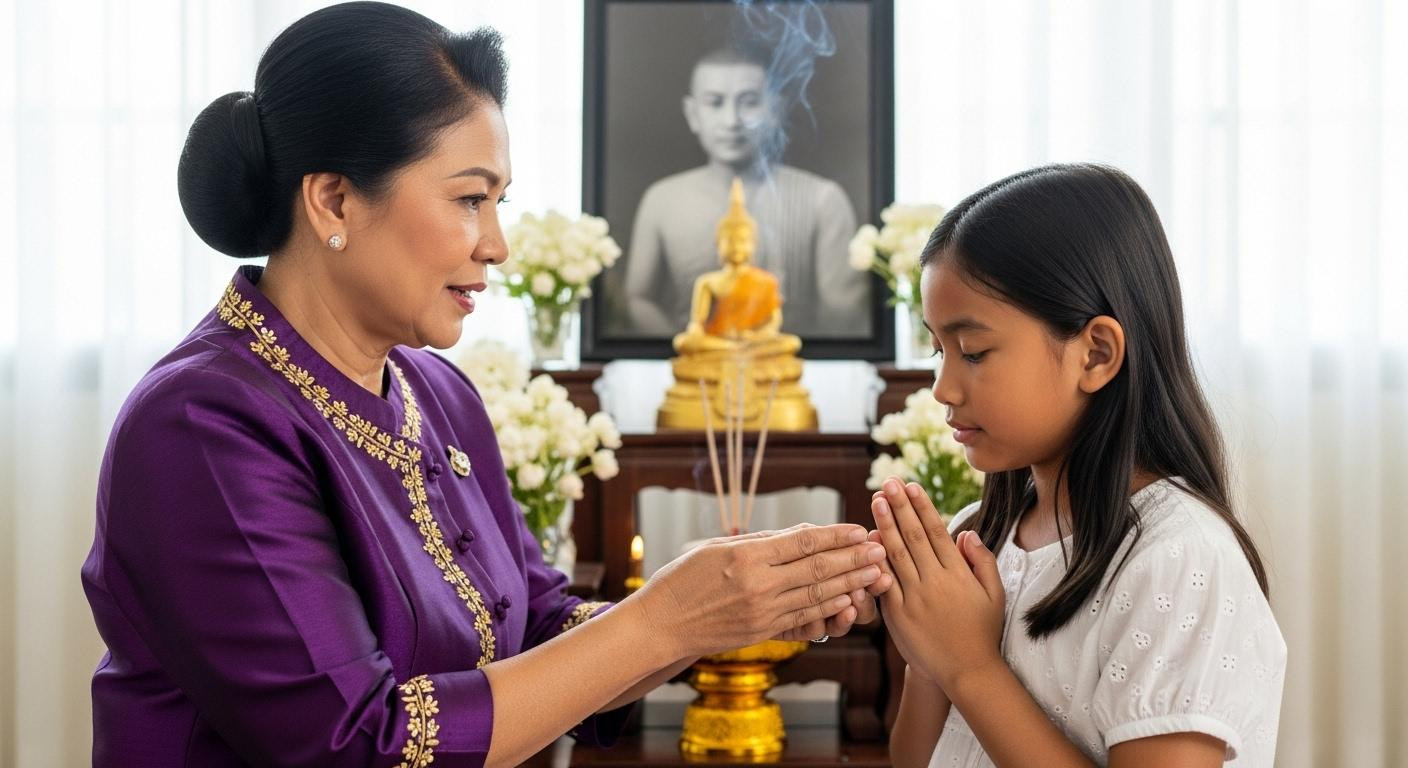October 24, 2025. Thailand’s palace announces Queen Mother Sirikit’s death at 93 years old. Within hours, the one-year mourning period begins. Government trips cancel, cultural events postpone. Seventy million Thais prepare for elaborate protocols their nation perfected over centuries. Royal funeral preparations commence, budgeted at $4-7 million. Every tradition activates seamlessly. Yet beneath this choreographed continuity lies Thailand’s most acute vulnerability: King Vajiralongkorn has not appointed an heir.
Thailand’s mourning mastery: centuries of royal continuity
Thailand’s monarchy possesses unparalleled institutional memory for royal deaths. The one-year mourning period aligns with traditions dating to the Ayutthaya Kingdom. Recent research published in the Journal of Asian Studies documents how these practices create profound cultural unity impacting daily life nationwide.
The $4-7 million royal funeral budget reflects ceremonial sophistication unmatched globally. Prime Minister’s ASEAN summit cancellation demonstrates immediate protocol activation. Southeast Asian political analysts note the monarchy’s central role in Thai political culture makes these responses automatic.
Queen Sirikit’s six-year hospitalization since 2019 allowed gradual preparation. The nation rehearsed this transition psychologically since her September 2019 admission. Cultural anthropologists observe Thailand approaches royal death with precision that demonstrates extraordinary institutional continuity.
Yet succession law reveals destabilizing vacuum
The 1924 Palace Law and 2017 Constitution require the reigning monarch to explicitly appoint an heir. King Vajiralongkorn has not. Constitutional law experts studying Thai succession note this creates a delicate process influenced by politics and tradition.
Constitutional requirements meet royal silence
Succession scholars at major universities confirm the Thai royal family faces a genuine crisis. The impending need for a competent heir is crucial to the monarchy’s stability. Unlike UK or Japanese systems where succession follows clear constitutional lines, Thailand’s depends on royal discretion.
The December 2022 collapse that changed everything
Princess Bajrakitiyabha, prior designated successor, collapsed December 15, 2022. She remains incapacitated after 34 months. Prince Dipangkorn, age 20, faces questions about succession eligibility. Prince Vacharaesorn’s 2023 return sparked speculation but no formal designation. Royal succession analysts note Vajiralongkorn’s delayed successor appointment creates unprecedented uncertainty, especially with his children’s varied health and status complexities.
The paradox: preparation cannot substitute for resolution
Thailand demonstrates how cultural strength and institutional vulnerability coexist. The monarchy commands reverence across 70 million citizens. Clinical psychologists studying royal deaths document deep psychological and communal effects when symbolic figures pass away.
When tradition meets institutional fragility
Yet succession vacancy exposes what elaborate mourning cannot address: legal requirements for heir designation remain unmet. Thailand can execute flawless protocols for a 93-year-old Queen Mother who died after years of hospitalization. Government functions cancel automatically. Millions allocate for ceremony.
But the system cannot produce the one element monarchy requires for continuity. Social scientists studying institutional systems note this reveals how tradition and protocol cannot substitute for fundamental institutional decisions.
October 2025 exposes what protocol cannot resolve
The counter-intuition crystallizes this moment perfectly. Perfect mourning preparation meets unresolved succession crisis. Queen Sirikit represented 60+ years of stability from her 1960 European tour through 2025. Her death removes a stabilizing figure precisely when succession clarity is needed most.
Royal historians confirm she was instrumental in shaping Thailand’s international perception as a cultural hub since the 1960s. Yet that same expertise in cultural continuity cannot address the constitutional vacuum her death exposes.
What 1-year mourning cannot mourn: unresolved future
Cultural observers note the profound irony unfolding across Thailand. One-year mourning honors Queen Sirikit’s legacy appropriately. Her birthday remains celebrated as Mother’s Day nationwide. Rural communities particularly revered her development projects and traditional craft preservation.
Yet that same year will unfold with succession uncertainty shadowing every royal event. Perfect mourning protocols cannot address the succession crisis they temporarily obscure. The monarchy’s intergenerational continuity depends on decisions no amount of ceremonial preparation can resolve.
Your questions about Thailand Queen Sirikit’s death answered
Why does succession matter during mourning?
Thai constitutional law requires the King to appoint an heir. The one-year mourning period doesn’t suspend this requirement. The monarchy’s stability depends on clear succession, and Queen Sirikit’s death amplifies urgency since she represented continuity from an earlier generation. Without designated succession, even perfect mourning protocols cannot ensure institutional stability.
How does Thailand’s mourning compare to other monarchies?
Thailand’s one-year official mourning period exceeds most Western monarchies like the UK or Japan (weeks to months). Cultural anthropologists document this as reflecting Southeast Asian reverence for monarchy that penetrates daily life nationwide, impacting 70 million citizens’ social activities and national events for the entire year.
What happens if no heir is appointed?
Constitutional scholars note Thailand entered uncharted territory. The 1924 Palace Law and 2017 Constitution provide heir appointment mechanisms but don’t address prolonged vacancy. Political and traditional factors intersect, creating what succession experts call a genuine crisis threatening monarchy stability in ways ceremonial continuity cannot address.
Bangkok, October 25, 2025, dawn. Black-ribboned portraits of Queen Sirikit appear on balconies across 70 million homes. One year of mourning begins. Yet in palace chambers, the question no protocol can answer: who inherits the throne? Perfect preparation meets unresolved future. The paradox Thailand cannot ritual away.
